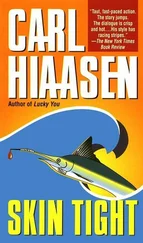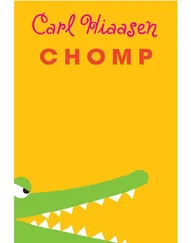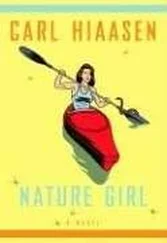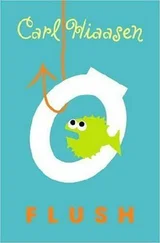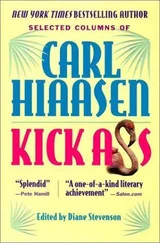Carl Hiaasen - A Death in China
Здесь есть возможность читать онлайн «Carl Hiaasen - A Death in China» весь текст электронной книги совершенно бесплатно (целиком полную версию без сокращений). В некоторых случаях можно слушать аудио, скачать через торрент в формате fb2 и присутствует краткое содержание. Жанр: Детектив, на английском языке. Описание произведения, (предисловие) а так же отзывы посетителей доступны на портале библиотеки ЛибКат.
- Название:A Death in China
- Автор:
- Жанр:
- Год:неизвестен
- ISBN:нет данных
- Рейтинг книги:3 / 5. Голосов: 1
-
Избранное:Добавить в избранное
- Отзывы:
-
Ваша оценка:
- 60
- 1
- 2
- 3
- 4
- 5
A Death in China: краткое содержание, описание и аннотация
Предлагаем к чтению аннотацию, описание, краткое содержание или предисловие (зависит от того, что написал сам автор книги «A Death in China»). Если вы не нашли необходимую информацию о книге — напишите в комментариях, мы постараемся отыскать её.
A Death in China — читать онлайн бесплатно полную книгу (весь текст) целиком
Ниже представлен текст книги, разбитый по страницам. Система сохранения места последней прочитанной страницы, позволяет с удобством читать онлайн бесплатно книгу «A Death in China», без необходимости каждый раз заново искать на чём Вы остановились. Поставьте закладку, и сможете в любой момент перейти на страницу, на которой закончили чтение.
Интервал:
Закладка:
"harness" was a bad word. "Unfetter" would be better. Unfetter the young millions, let them think and act and build without the constraints of a revolution grown old before its time. Would they yank China headlong, breathless and excited, into the twenty-first century, or would they produce some monstrous new revolution? The last time the young had been mobilized, it had been by Mao, and that little adventure-the Cultural Revolution-had cost China a decade of development and a generation of young people who discovered too late that being revolutionary too often meant being uneducated as well.
Two thoughts occurred to Stratton simultaneously. The first was that if Kangmei was willing to help him, then she was openly at odds with her own father. The second was more chilling than revealing: If Kangmei's network of disaffected young people was any more than a nebulous and idealistic dream, if it had any form at all, any organization that posed the slightest threat to the state or to the Party, then it was only a question of time until authority in all its multi-bludgeoned wonder fell on it like a ton of bricks. Such was the historic international lesson of communism. Hungary, Czechoslovakia, Democracy Wall, Solidarity…
"… successive dynasties built successive capitals in and around present-day Xian. At the beginning of the Tang Dynasty, Changan was a metropolis of over one million people, six miles square and girded by stout walls breeched by eight gates. The Tang palace was nearly a mile square inside the city and protected by a wall nearly sixty feet thick at its base. Enough remains to keep us more than busy for the two days we have." An avuncular smile.
Stratton knew exactly what he wanted to accomplish in Xian. It had been his reason for not flying home with David's body: He wanted to know what had happened between the two brothers and if, by any means, it could have led to David's death.
Stratton must have sighed aloud, for it drew J. Paul Prudoe's ire.
"… forest of steles, pagodas, pottery and a celestial army. Professor Stratton?"
Stratton stood up. "May I be excused, please, Mr. Prudoe? I have to go to the bathroom."
He left the art historians to mutter at his insolence and walked out into the early morning sunshine. In the courtyard of the hotel, draped around the open door of a gray Shanghai saloon, stood Kangmei.
"Are you Professor Stratton?" The smile was dazzling. "Good morning, and welcome to Xian. I am Miss Wang and this is Mr. Xia. We are your guides. Please get in."
The rail-thin Mr. Xia, it turned out, was a legitimate China Travel Service guide. That he was one of Kangmei's young allies went without saying, for she too wore the same guide's red identification pin on her white cotton blouse.
Kangmei's friend smiled a lot and spoke little, although his English proved to be quite good. Xiao-Xia, she called him.
Leaving the hotel, they drove through handsome, wide streets with little traffic. At one clutter of shops, Stratton did a double take. There on the sidewalk, in English, was a sandwich board announcing "Xian's First Exhibition of Abstract Art."
"I never saw anything like that in Peking," Stratton said. Kangmei and the guide laughed. The third Chinese, the driver, was a lugubrious soul with sharp features. He gave no sign of understanding, no English.
"And you never will," chirped Kangmei, radiant with excitement. "Abstract art-what would the old men say to that? That it was counterrevolutionary, of course. Here it is different. Remember, Thom-as, that the farther you get from Peking, the more relaxed are the people and the easier the rules. I would like to show you the south someday, where my mother's family lives. You would think Peking was in another country."
"There are fewer police here," confirmed Mr. Xia, the guide.
They drove toward what seemed to be the center of the city, a giant tower that stood as a high-hatted civic sentinel.
"Where are we going?" Stratton asked.
"That is for you to decide," Kangmei replied. "But you must see the Bell Tower.
It is very old, very famous." She gestured ahead.
"Once it was the center of the Tang imperial city, in about the ninth century," said Mr. Xia in reflexive patter-for-tourists. "It was restored again after Liberation. From the second story, there is a fine view of the city-"
Stratton cut him off. "Kangmei, what I really want to know is what your father and your uncle fought about. I want to go to some of the places they might have gone together; someone might have heard something. I will see the sites of Xian some other time."
"I see," she said doubtfully, and lapsed into a lengthy exchange of Chinese with Mr. Xia.
"It will be difficult, Thom-as. There are so many places. And what do we say?"
"We say that I am a friend of the distinguished American brother of Deputy Minister Wang. Anything like that will do, and there can't be all that many places. What exactly is your father's responsibility here?"
She thought about that one.
"He is everything and he is nothing. There are many cultural places in China, and they are usually controlled by local authorities. Until the old men in Peking get interested in one of them. Then it is my father's job to carry out their wishes. At least, I think that is how it works. My father does not confide in young daughters."
"All right. Between you and Mr. Xia, you must be able to think of some things special here that have interested the old men in Peking. That is where we go."
"It is a good plan, Thom-as," she said. There followed another Mandarin interlude. "There are five or six such places."
They visited the historical museum, a fourteenth-century temple, a thirteenth-century drum tower and Big Goose Pagoda south of the city, originally built early in the seventh century by the Tang, or was it the Sui? They walked the Ming city walls, and visited the neolithic site at Ban Po. Dynasties and centuries began to run together for Stratton. At each stop, Stratton and Mr. Xia would do a quick tourist round and Mr. Xia would ask to see the comrade in charge so that a distinguished American visitor could pay his respects. None of the comrades seemed overworked. To a man, they all poured gracious tea and exchanged compliments interminably. Three of them knew of Comrade Wang from Peking. None had ever met his distinguished brother. By midafternoon, Stratton wondered whether his patience or his bladder would burst first. Kangmei attended none of the interviews. Instead, she wandered around, "talking to the young people," as she put it. It was hard for Stratton to know whether she was devoted more to seeking information or to recruiting for her cause.
"So much for the Taoist Temple of the Eight Immortals." Stratton sighed as he sank back into seat cushions already dank with his sweat. "Now what?"
"The Qin ruins to the east of the city. It will take us about thirty minutes to get there, Thom-as." She ran light fingers across his cheek. "Do not be discouraged."
They drove through an intensely cultivated valley, past communes that seemed rich by Chinese standards. Suddenly, the car turned sharply onto a narrow strip of asphalt that looked as if it had been laid as an afterthought. Through gaps in the fields of chest-high corn, Stratton could see a large cone-shaped hill off to the right.
"That is Mount Qin, the tumulus," said Mr. Xia. "It was looted three years after the emperor's death, when the dynasty fell. It took an army three days and three nights to carry away treasure from the tomb. The new excavations have not reached it yet, so it is not known what the grave robbers may have left. The current excavations are all here, to the west of the tumulus."
"What's that?" Stratton nodded toward a squat, two-story building with a big chimney about a quarter mile off to the left.
Читать дальшеИнтервал:
Закладка:
Похожие книги на «A Death in China»
Представляем Вашему вниманию похожие книги на «A Death in China» списком для выбора. Мы отобрали схожую по названию и смыслу литературу в надежде предоставить читателям больше вариантов отыскать новые, интересные, ещё непрочитанные произведения.
Обсуждение, отзывы о книге «A Death in China» и просто собственные мнения читателей. Оставьте ваши комментарии, напишите, что Вы думаете о произведении, его смысле или главных героях. Укажите что конкретно понравилось, а что нет, и почему Вы так считаете.

